Shanghai turns to Hollywood to increase its impact

The rising strength of Chinese box office receipts has meant more and more importance is being placed on the country's largest film festival - both in terms of international studios looking to get in on the action and in terms of mainland filmmakers looking to reach the world outside.
And that's one reason why this year's Shanghai International Film Festival - being held from June 11 to 19 - has been able to call in one of Hollywood's major players to head its jury.
Oscar-winner Barry Levinson ( Rain Man) will this year lead the jury for the SIFF's main award - the Golden Goblet - which organizers claim will be contested by 1,519 films from 102 countries.
Joining Levinson on the panel will be a collection of international filmmakers - including Japanese director Yoichi Sai, the Vietnam-born French director Tran Anh Hung, British screenwriter Christopher Hampton, Spanish actress Paz Vega and the Chinese pair of director Wang Quan'an and actress Zhang Jingchu.
They'll certainly have their work cut out for them - given the amount of films being screened at a festival which often boosts its program with local Chinese productions that never again make it to a cinema. Organizers also said in a statement that this year the festival had attracted productions from as far afield as Argentina, Italy, Japan, Germany, Turkey and Russia.
The Shanghai festival has been running in one form or another since 1993 but has in recent years reached out more internationally as the international film industry moves to involve China in its plans.
Box office receipts in China last year climbed a record 65 percent - to US$1.5 billion - as more cinemas were built. Chinese media claims that on average for the past 12 months China has opened one new cinema screen per day.
Those new screens need new films and that's why Shanghai has also tried to strengthen its position - both in Asia and globally - by developing the film market that runs concurrently with the festival, in an effort to establishing the event as an important venue for business. The maket is now seen by industry players as less important overall than rival markets held yearly at the Busan International Film Festival and the event in Tokyo - but more important than those events in terms of making connections in China.
There's some excitement too for the public annually now in Shanghai with a series of red carpet events and gala parties, to go with seminars focussing on trends in Chinese filmmaking.
MS
Join our commenting forum
Join thought-provoking conversations, follow other Independent readers and see their replies
Comments
Bookmark popover
Removed from bookmarks